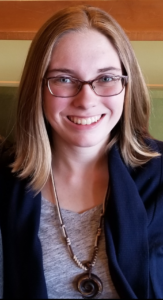I had the opportunity to speak with Stephanie Zemba concerning her research experience with Dr. Hoffman and Dr. Mehrotra on examining interfaith dating relationships.
Can you describe what your research project is about?
Our research project examined interfaith dating relationships among college students, including students’ experiences, attitudes or views, expectations, and apprehensions. Drs. Kristi Hoffman and Meeta Mehrotra were the primary investigators, and they conducted five focus groups, which fell into two categories depending on whether students had interfaith experience (personally or through family/friends). Interfaith relationships were broadly defined to include faith-no faith and interdenominational relationships as well as a relationship between two individuals from different faith traditions.
I joined this project as a Research Fellow after the data was already collected, so I was primarily involved with analysis and helping to write up the results. Our article, called “Students’ Attitudes Towards Interfaith Relationships: The Impact of Parents, Religiosity, and Christian Privilege,” will be published in the Journal of College and Character this month. It discusses three main themes that arose from an analysis of the focus group data: the continued relevance of parents’ opinions about dating partners, the importance of religiosity in a religiously mixed relationship, and the role of Christian privilege in shaping attitudes towards potential dating partners who do not follow a Christian faith tradition.
What made you decide to pursue your topic?
I was interested in joining Drs. Hoffman and Mehrotra’s research team because my parents are in an interdenominational marriage. Several difficulties arose from these relatively minor religious differences in their relationship, most notably the negative reactions of my dad’s side of the family. Listening to my parents discuss their experiences sparked my interest in learning more about how religion shapes partner choice, relationships, and family life.
Why did you decide to do research?
My career goal is to become a professor of sociology and gaining research experience is very helpful as a prelude to a Ph.D. program. In addition to the practical benefits of learning the basics of research as an undergraduate, I enjoy the process of discovery that comes along with conducting a research project. Sociologists examine the social world, and I think that the best way to understand the multiple facets of a topic or issue is to ask people about it directly!
How has your experience with your research advisor been?
Drs. Hoffman and Mehrotra have both been wonderful advisors and mentors! I have enjoyed collaborating with them on several research projects, which has given me experience in all stages of the research process, from the design/planning phase to writing up results. Like all great mentors, they always see the potential in me and provide me with encouragement and support. Many of the opportunities that they encouraged me to apply for have really helped me develop as a person and as a scholar, including conference presentations, RC’s Summer Scholars, and the American Sociological Association’s Honors Program.
What has been your favorite or most interesting part of your research project so far?
My favorite part of this research project was the critical analysis we did when developing the Christian privilege theme. This was one of the major contributions of our paper, as few researchers examining interfaith relationships in the U.S. have considered the structural dominance of Christianity and how power inequalities between religious groups can influence openness towards interfaith relationships. In this section, we also discuss the need to encourage the development of religious literacy among college students, and the steps that higher education institutions can take to broaden students’ understanding of diverse religious groups.
What would you say to current and incoming students interested in doing research?
The first step to doing research is simply asking a professor about their interests and any research projects they are involved in or considering! While this may seem intimidating, it can lead to you becoming involved with a professor’s research project or developing an independent study with them. There are a lot of ways to do research, including as a volunteer, for course credit, or for pay. For current students, I would stress that it’s never too late to become involved in research!
